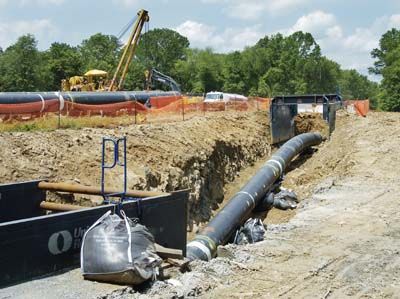By Lea Kahn, Staff Writer
MONTGOMERY — Work on the final segment of Williams-Transco’s natural gas pipeline, off Cherry Valley Road, has begun and should be finished in about one month, according to Montgomery Township officials.
Williams-Transco received permission from the state Department of Environmental Protection and the Federal Energy Regulatory Commission to dig a trench through fields and streams off Cherry Valley and Cherry Hill roads earlier this month.
“The staff will be monitoring the work. (Williams-Transco) told us it is their plan to be done in one month’s time,” said township Administrator Donato Nieman. He added that he had not heard any comments from neighbors.
Williams-Transco applied for permission to dig the trench, following three failed attempts to tunnel underground to install the pipeline. The company hit rock each time it tried to install the pipeline, damaging the drill bits.
The company completed the 6-mile loop, known as the Leidy Southeast Expansion Project-Skillman Loop, in December 2015. It bypassed the 1,200-foot-long segment, but claimed it needed to install the remainder of the Skillman Loop through the fields off Cherry Valley Road, near Cherry Hill Road.
The pipeline loop is a segment of pipeline installed next to an existing pipeline, connected to it at both ends. It allows more natural gas to be moved through the system. The missing segment of the Skillman Loop is needed to allow the company to inspect and maintain the natural gas pipeline.
The company needs to install the missing link for contractual reasons, a company official said. It is obligated to deliver a specific amount of natural gas, and the bypass creates a restriction in the pipeline that could affect the delivery of the product.
At a public hearing on the request in August, project manager John Todd said the company wanted to dig a trench within 30 feet of its 75-foot-wide right-of-way. The DEP had authorized a 25-foot-wide corridor for the trench, and the company sought and additional 5 feet.
Mr. Todd said the two streams that would need to be crossed only flow when it rains and when the snow melts. They are classified as non-trout fisheries, and given the volume and amount of intermittent flow, they are unlikely to support fish or other aquatic species, he said.
Christopher Brown, the company’s director of engineering, said the loop is necessary to ensure reliability. If the missing segment of the loop is not completed and the pipeline running parallel to it failed, there would be service disruptions.
Mr. Brown, who also spoke at the August public hearing, said pipeline systems are designed for peak capacity, which usually occurs during the winter months.
Reliability of the system — in this case, the Skillman Loop — is ingrained in any engineering project, from subways to suspension bridges, Mr. Brown said.

